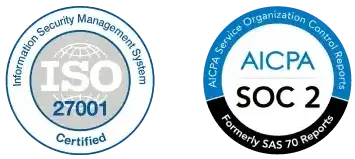Quick Summary
The best SMS marketing platform for engagement, CRM integration, global compliance, and scalable growth. Start your free trial with HelloSend today!
Have you seen this? SMS campaigns deliver an astonishing up to 7,100% return on investment, nearly doubling email’s performance.
That figure brings one question to the forefront: with business text messaging response rates as high as 45% and open rates nearing 98%, how are global SMBs and mid-market firms not treating SMS as a core growth driver?
If your team uses Zoho, HubSpot, or Pipedrive, you already understand the importance of keeping customer outreach both measurable and seamless.
This blog explores what makes the best SMS marketing platform that not only drives immediate engagement but also fits cleanly into your existing CRM workflows, supports global compliance, and scales with your growth goals.
Why Choosing the Right SMS Marketing Platform Matters
Selecting the best SMS marketing platform is not just about sending messages—it is about aligning communication with business goals, customer expectations, and compliance standards. A well-chosen platform ensures every message adds value and fits seamlessly into existing workflows.
Key reasons why the right choice matters:
- Integration with CRMs (Zoho, HubSpot, Pipedrive, Salesforce, etc.)
The SMS marketing tool should connect directly with your CRM to keep customer data consistent. This approach avoids duplication, ensures accurate targeting, and enables teams to track conversations within the systems they already use. - Compliance & Deliverability (GDPR, TCPA, and global regulations)
Businesses must follow strict opt-in and unsubscribe rules. A reliable platform manages these automatically, protecting customer trust and reducing legal risks. - Scalability for SMBs and Mid-Market Firms
Whether sending hundreds or thousands of messages, the platform should support growth without compromising delivery speed or reliability. - Unified Messaging with Calling & Automation
Modern communication strategies go beyond SMS. The right platform offers multi-channel features such as WhatsApp integration, voice calling, and automated workflows, giving teams a single hub for customer engagement.
In short, the best SMS marketing platform empowers businesses to stay compliant, connected, and prepared for growth.
Comparative Table: Which SMS Marketing Platform Is Best in 2026?
What Are the Top 7 Best SMS Marketing Platforms in 2026?
Finding the best SMS marketing software depends on business needs, CRM integrations, and communication goals. Below is an in-depth look at seven leading platforms in 2026, their features, strengths, and possible limitations.
1. HelloSend – Unified Messaging for SMBs and Mid-Market Firms
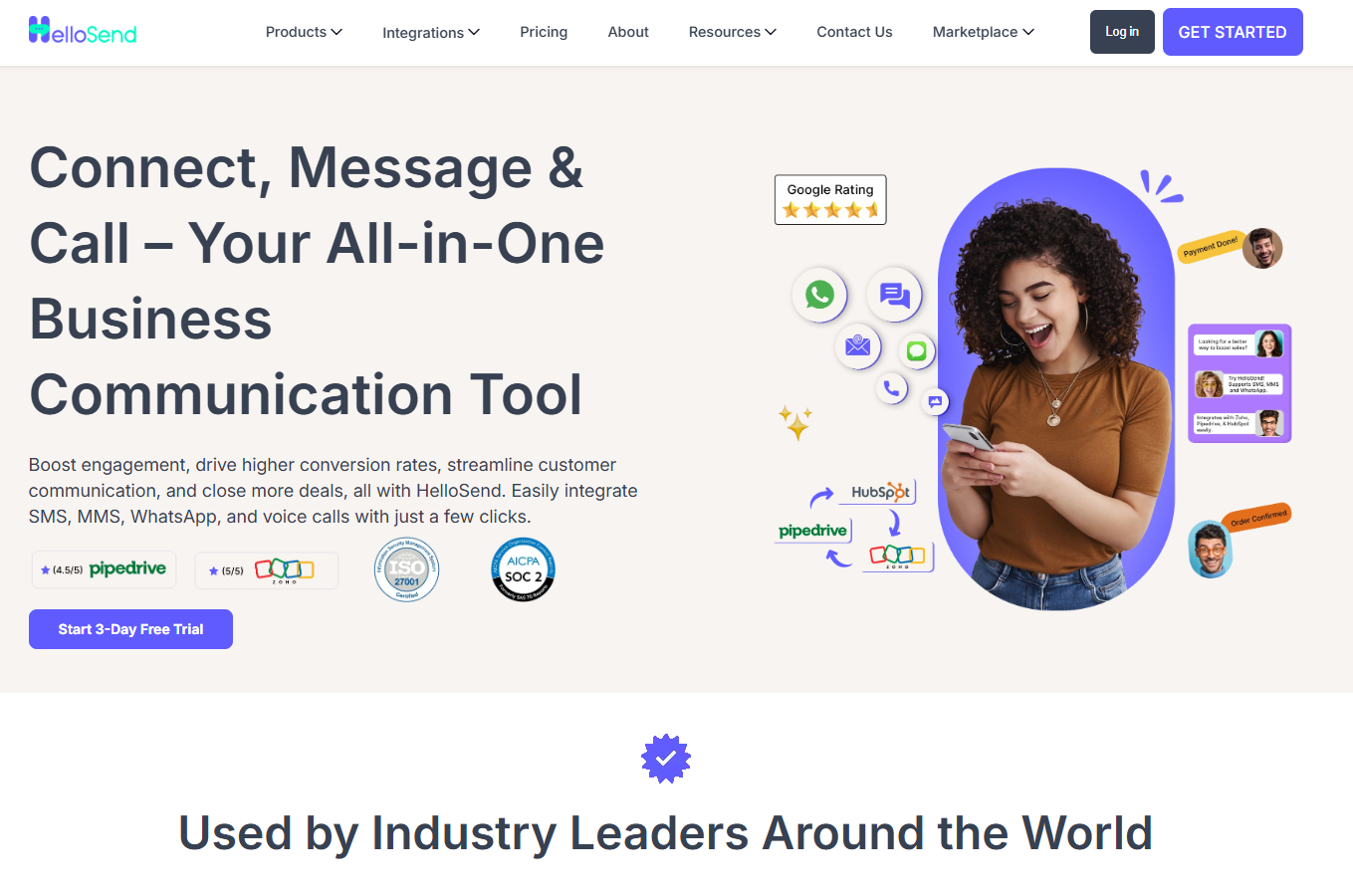
HelloSend is designed to go beyond SMS. By combining SMS, WhatsApp, and calling under one roof, it enables sales, marketing, and support teams to handle customer engagement without switching tools. It’s tailored for SMBs and mid-market companies that use CRMs like Zoho, HubSpot, and Pipedrive.
Features:
- Direct CRM integrations with Zoho, HubSpot, and Pipedrive.
- Two-way SMS conversations for sales and support.
- WhatsApp and calling within the same interface.
- Workflow automation for reminders, follow-ups, and promotions.
- International coverage with built-in compliance for GDPR and TCPA.
Pricing:
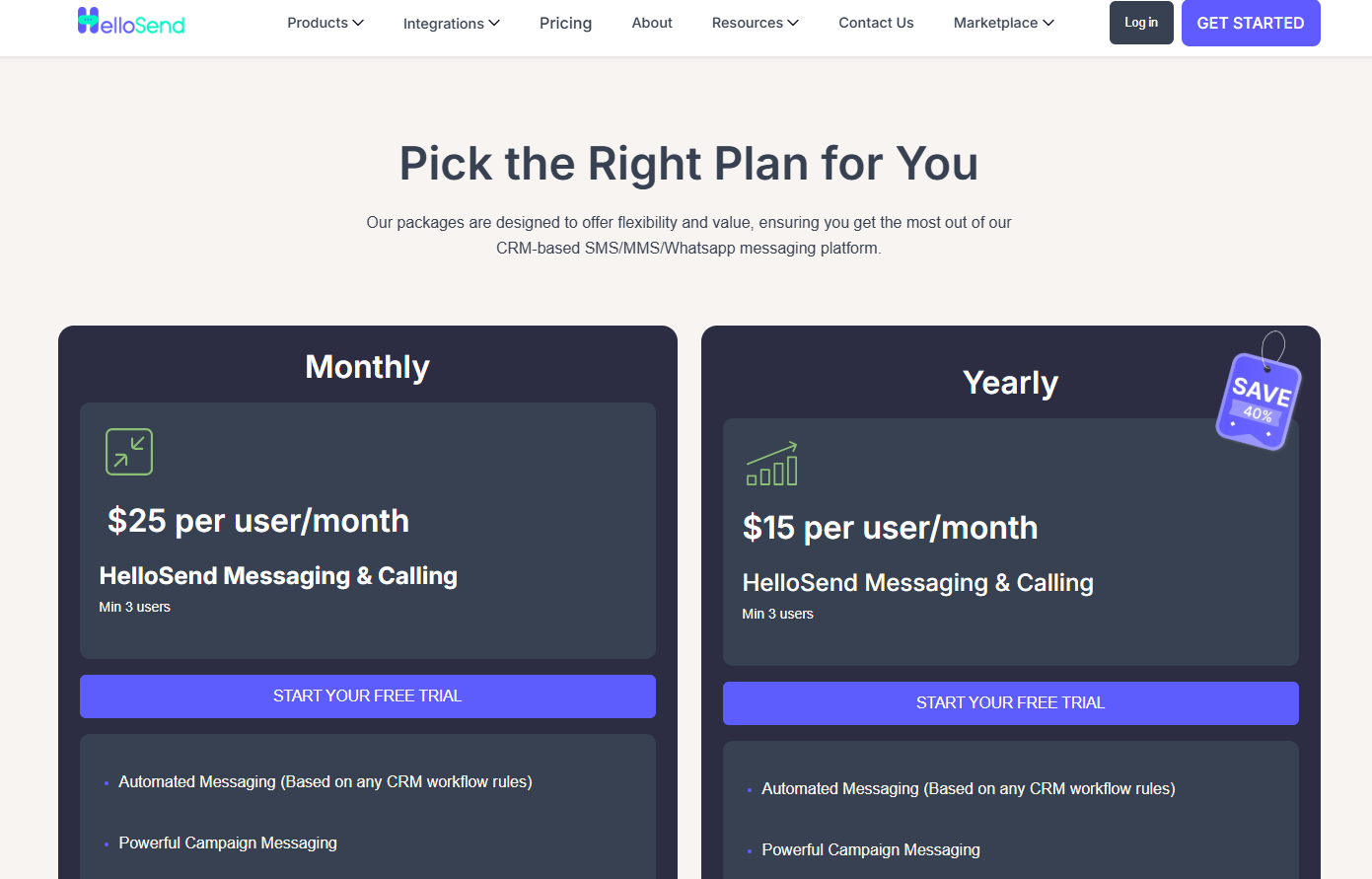
HelloSend offers flexible per-user pricing with a minimum of three users:
- HelloSend Essential
- Monthly: US$15 per user/month.
- Yearly (billed annually): US$9 per user/month.
- Includes automation, campaign messaging, direct messaging, templated SMS, opt-in/out tools, a unified inbox, SMS/MMS/WhatsApp integration, and delivery reporting.
- Monthly: US$15 per user/month.
- HelloSend Messaging & Calling
- Monthly: US$25 per user/month.
- Yearly: US$15 per user/month.
- Adds full voice calling features while retaining all SMS and WhatsApp capabilities.
- Monthly: US$25 per user/month.
Pros:
- Cost-effective plans tailored for SMBs.
- Seamless CRM connectivity that eliminates data silos.
- Multi-channel messaging saves money on additional tools.
- Intuitive interface reduces onboarding time.
Cons:
- Not built for complex enterprise-level automation at scale.
Why it’s Ideal:
HelloSend is positioned as the best SMS marketing platform for small businesses that want to simplify communication. Instead of paying for separate tools for SMS, WhatsApp, and calling, teams get a single, unified solution—reducing complexity and costs while keeping customer data connected.

2. SimpleTexting – Beginner-Friendly SMS Marketing
SimpleTexting is a straightforward choice for businesses new to SMS campaigns. Its clean UI and accessible features make it ideal for small teams.
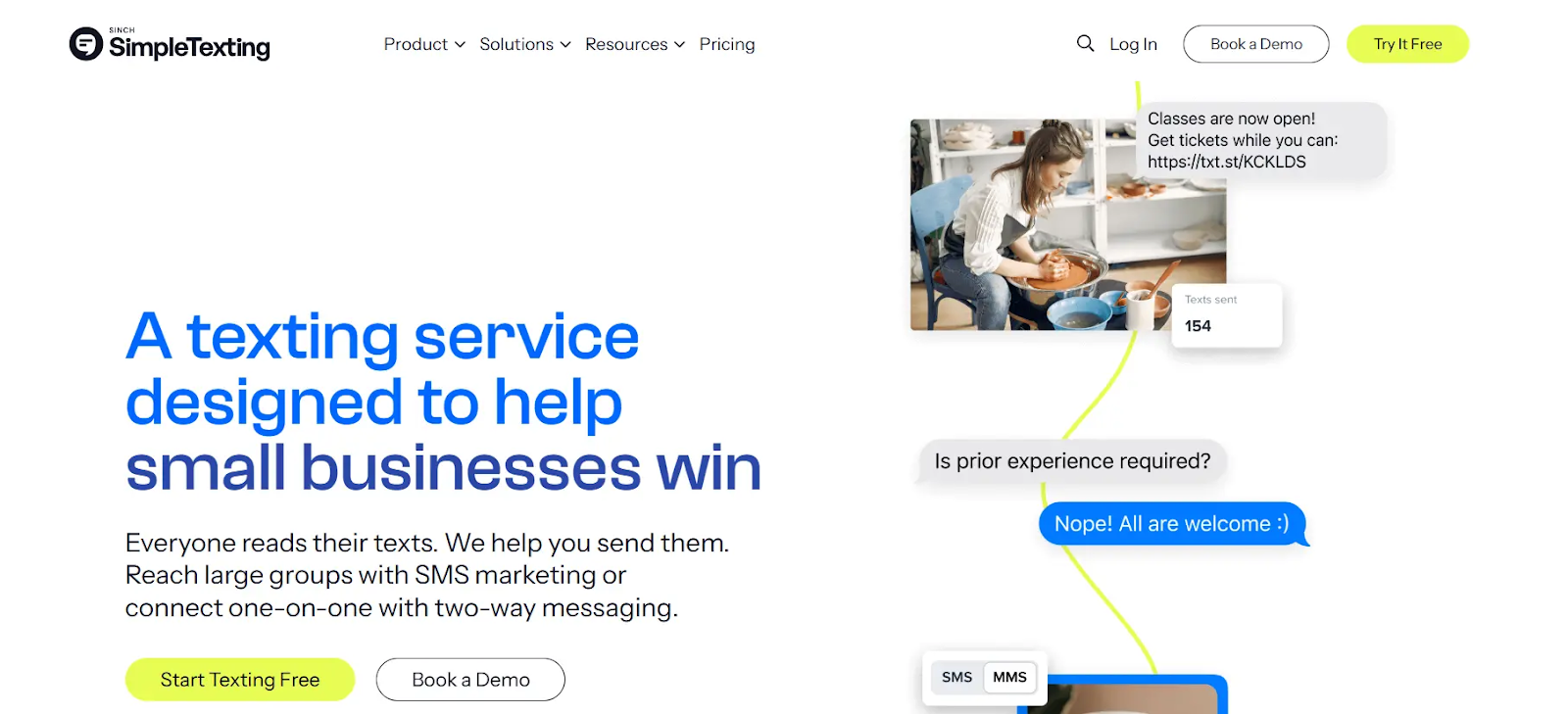
Features:
- Top bulk SMS platforms for e-commerce blasts with keywords and autoresponders.
- List segmentation and campaign scheduling.
- Zapier-powered integrations, with direct HubSpot support.
Pros:
- User-friendly interface with minimal setup.
- Affordable SMS marketing software for startups.
- Strong keyword-based campaigns for list growth.
Cons:
- Advanced automation is limited.
- Reliance on Zapier for most CRM connections.
Best For:
Small businesses running simple marketing campaigns or those testing SMS before scaling into multi-channel tools like HelloSend.
3. Klaviyo – E-Commerce Automation Powerhouse
Klaviyo is a marketing automation leader in e-commerce, combining email and SMS with advanced segmentation.
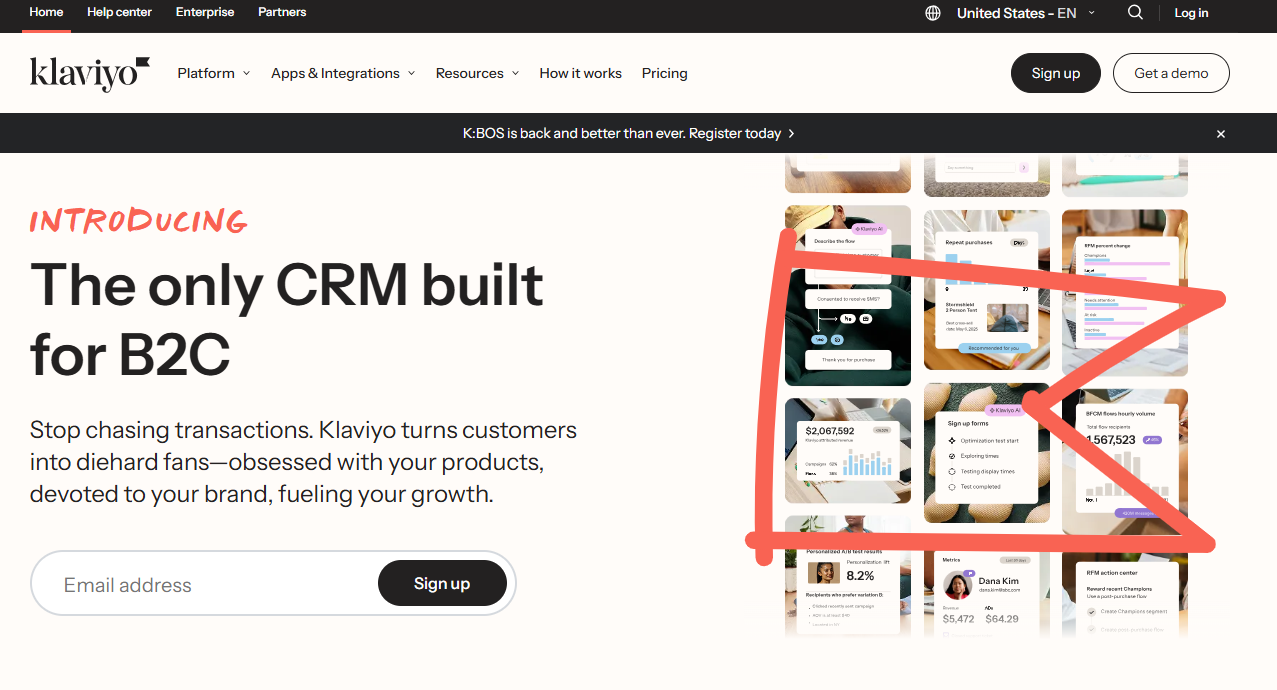
Features:
- Automated SMS + email workflows.
- Detailed segmentation based on purchase behavior.
- Native integrations with Shopify, WooCommerce, and Magento.
Pros:
- Deep data insights for e-commerce campaigns.
- Excellent personalization capabilities.
- High ROI potential for online retailers.
Cons:
- Steeper learning curve for beginners.
- Expensive for non-ecommerce businesses.
Best For:
E-commerce brands are seeking the best SMS marketing platform to complement email campaigns with advanced targeting and personalization.
4. Omnisend – Omnichannel Marketing for Retailers
Omnisend appeals to businesses seeking a comprehensive marketing toolkit. It combines SMS, email, and push notifications, helping teams create cohesive campaigns.
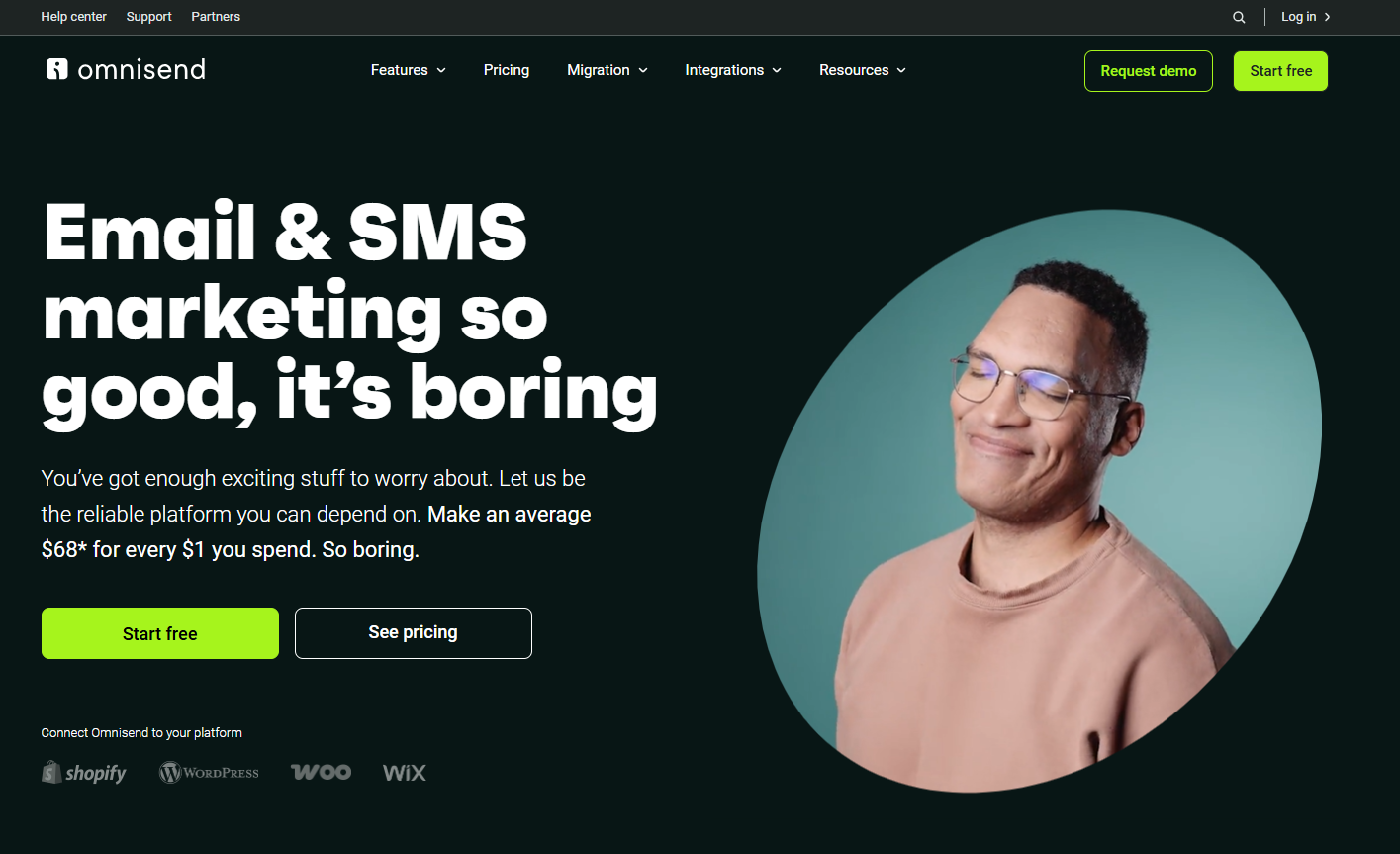
Features:
- Pre-built automation workflows.
- A/B testing for SMS and email.
- HubSpot and e-commerce CRM synchronization.
Pros:
- Great for omnichannel strategies.
- Easy-to-implement automation.
- Strong analytics dashboards.
Cons:
- Costs can rise quickly with higher message volumes.
- Primarily retail and e-commerce focused.
Best For:
Brands that rely on multiple customer touchpoints beyond SMS.
5. SlickText – Engagement-Driven SMS Campaigns
SlickText focuses on growing and engaging SMS subscriber lists through keyword-based campaigns.
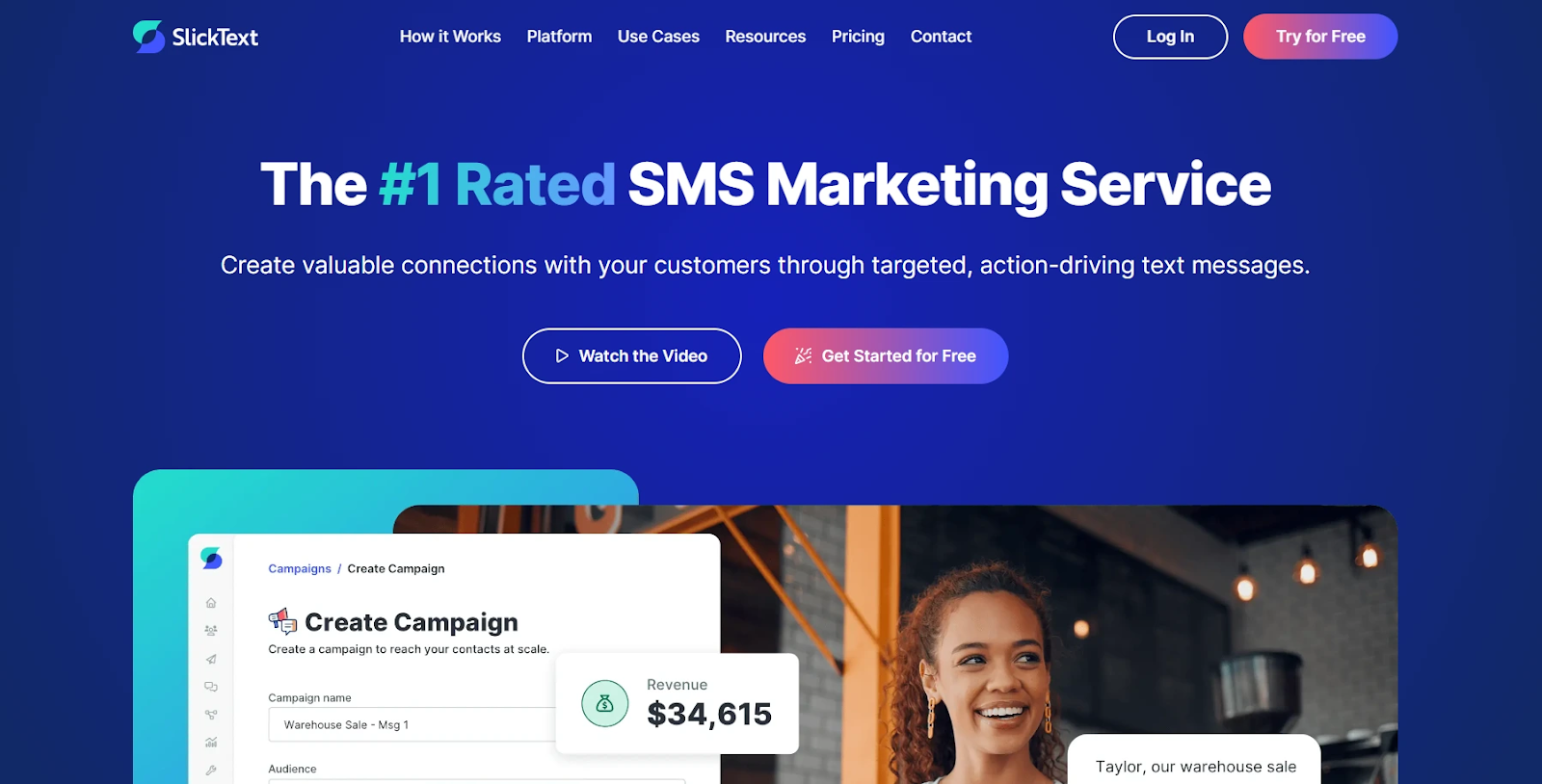
Features:
- Text-to-join keyword functionality.
- Contact list management.
- Integrations available through Zapier.
Pros:
- Great for subscriber acquisition.
- Simple setup for non-technical teams.
- Easy campaign management.
Cons:
- Lacks advanced automation.
- Limited CRM-native integrations.
Best For:
Companies prioritizing audience growth and simple SMS engagement include gyms, local retailers, and small event organizers.
6. TextMagic – Reliable for Transactional SMS
TextMagic is best known for transactional communication like OTPs, alerts, and reminders rather than large-scale marketing.
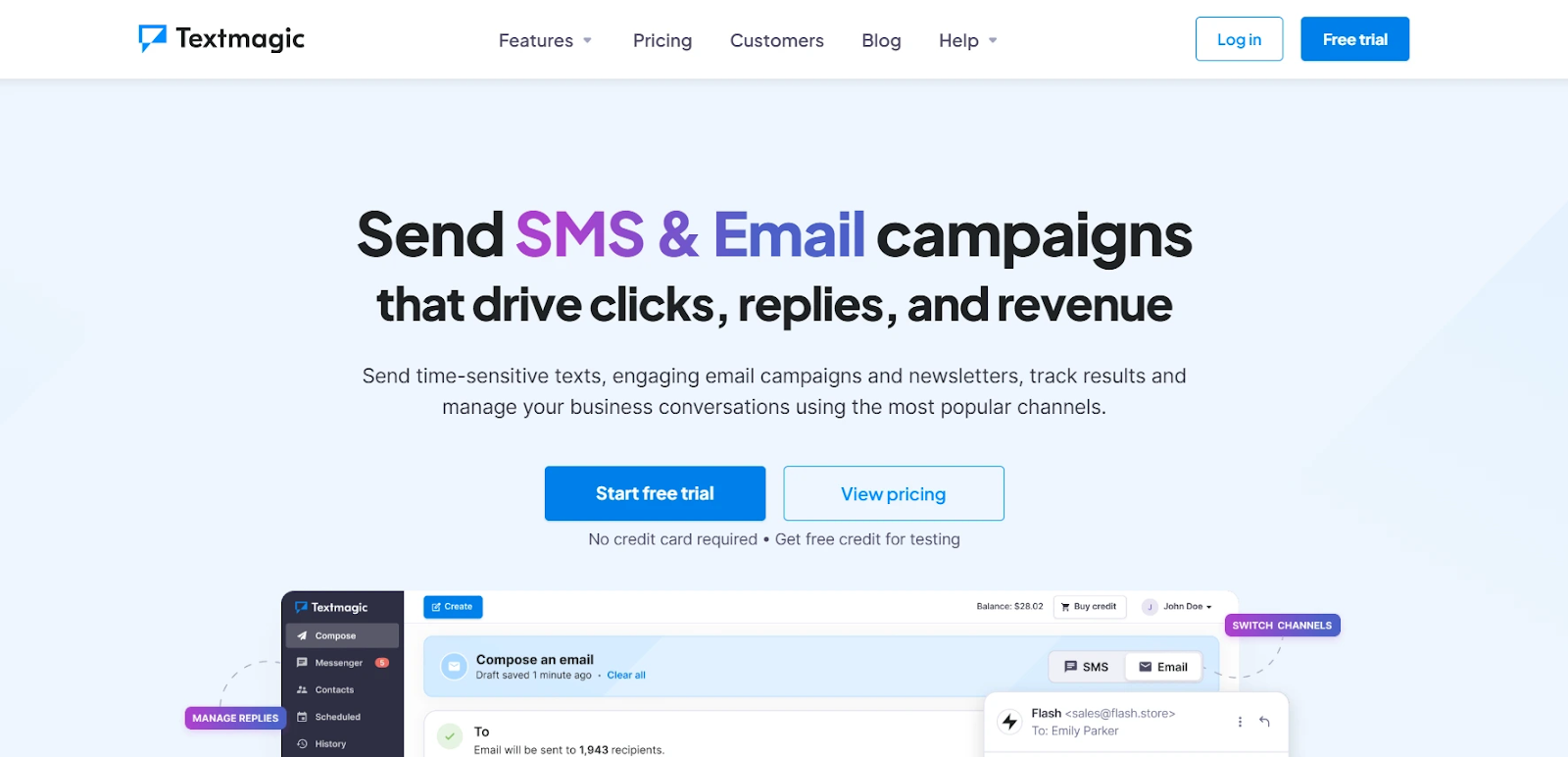
Features:
- International SMS delivery across 200+ countries.
- Bulk messaging and scheduling.
- API support for custom workflows.
Pros:
- Highly reliable for transactional delivery.
- User-friendly interface.
- Global reach with strong delivery rates.
Cons:
- Limited campaign automation features.
- CRM integrations require API or middleware.
Best For:
Healthcare providers, logistics companies, and businesses need time-sensitive notifications.
7. MessageDesk – Team Messaging and Scheduling
MessageDesk focuses on collaborative communication for service-oriented businesses. It’s beneficial for field teams that manage appointments.
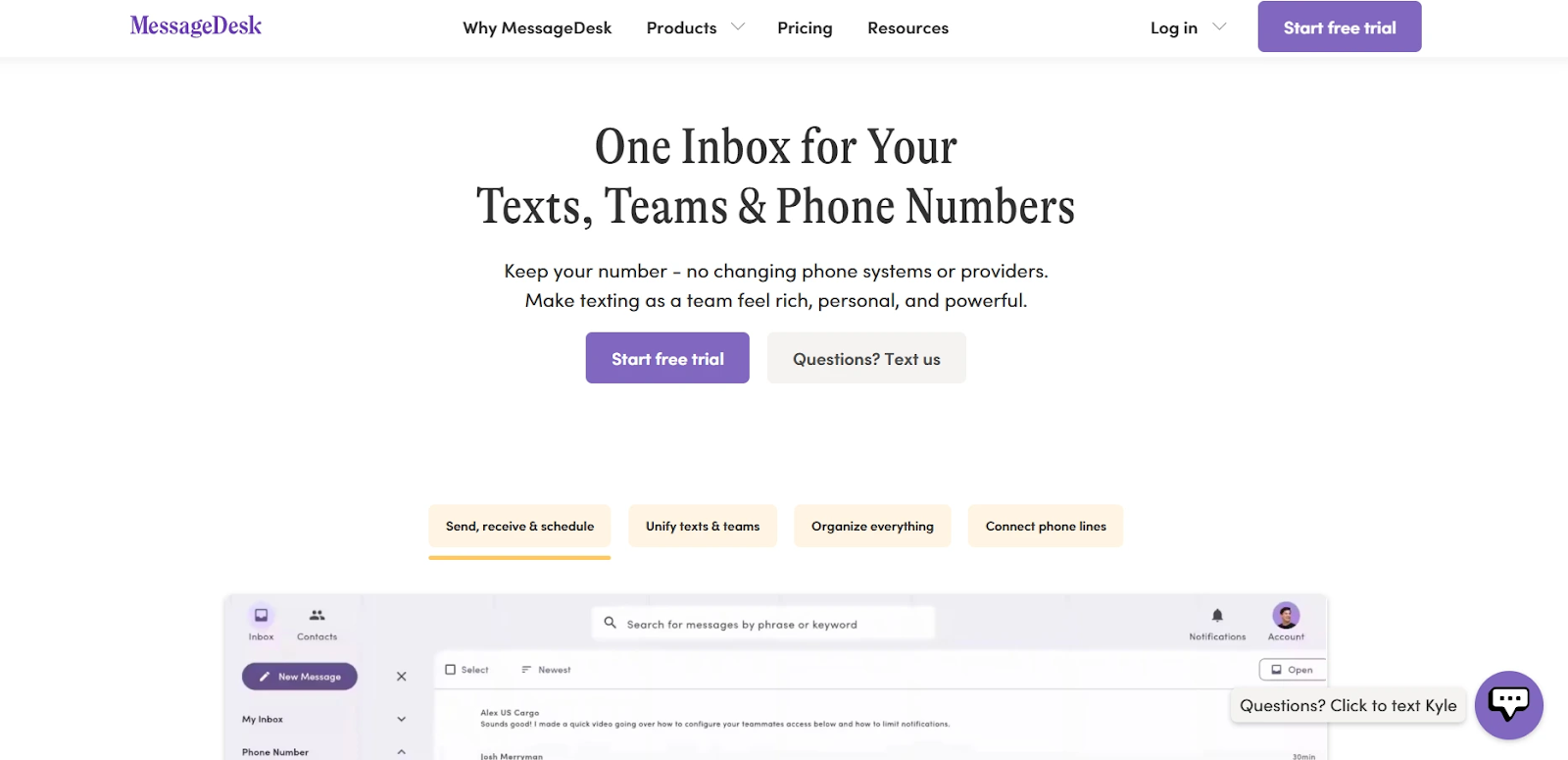
Features:
- Shared team inbox for SMS replies.
- Appointment reminders and scheduling.
- Native integration with Pipedrive, plus Zapier support.
Pros:
- Great for team-based workflows.
- Simplifies appointment-related messaging.
Cons:
- Not designed for high-volume SMS marketing campaigns.
- Limited feature set compared to multi-channel tools.
Best For:
Field service teams, repair companies, or consultants need organized, team-friendly SMS communication.
How to Choose the Best SMS Marketing Platform for Your Business
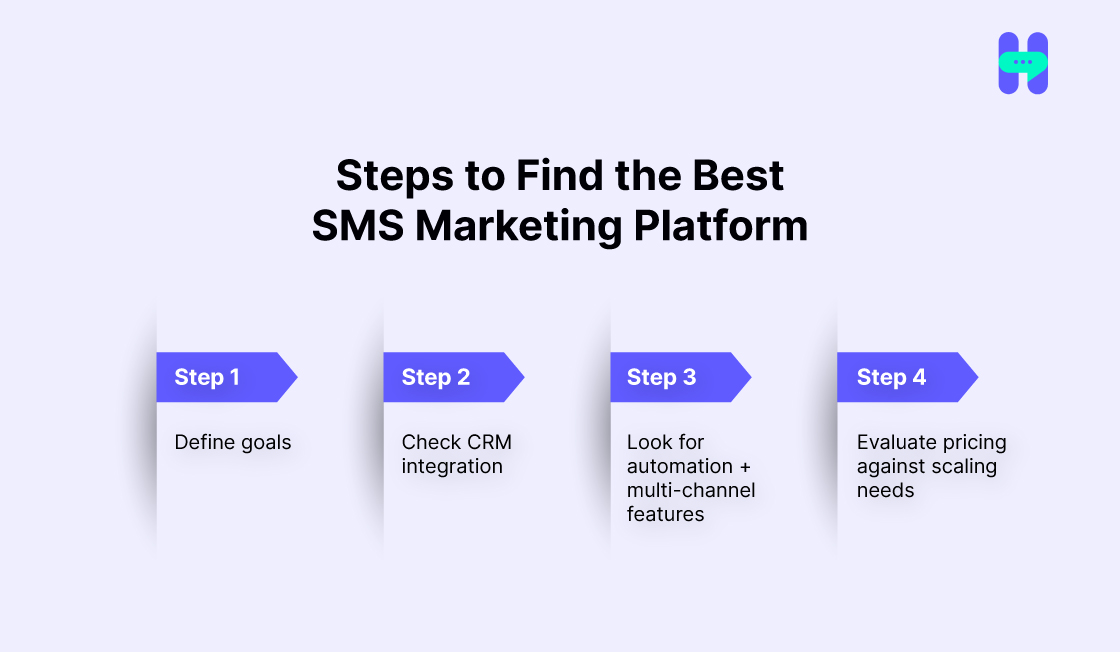
Finding the best SMS marketing platform begins with aligning technology to your business needs. With so many options available, the right choice comes down to clarity on goals, compatibility with existing systems, and the ability to grow alongside your business.
- Step 1: Define goals
Decide whether your primary focus is sales conversions, customer support, or retention. Each goal may require different features, from campaigns to real-time support messaging. - Step 2: Check CRM integration
Ensure the platform integrates seamlessly with CRMs like Zoho, HubSpot, or Pipedrive, so all customer interactions stay in one place. - Step 3: Look for automation + multi-channel features
Go beyond SMS with workflows, WhatsApp integration, and calling capabilities to manage communication from a single hub. - Step 4: Evaluate pricing against scaling needs
Consider both short-term affordability and long-term scalability as your messaging volume grows.
This is why HelloSend is designed for growing SMBs and mid-market firms—balancing affordability, automation, and multi-channel messaging in one platform.
Evaluation Criteria for the Best SMS Marketing Platform
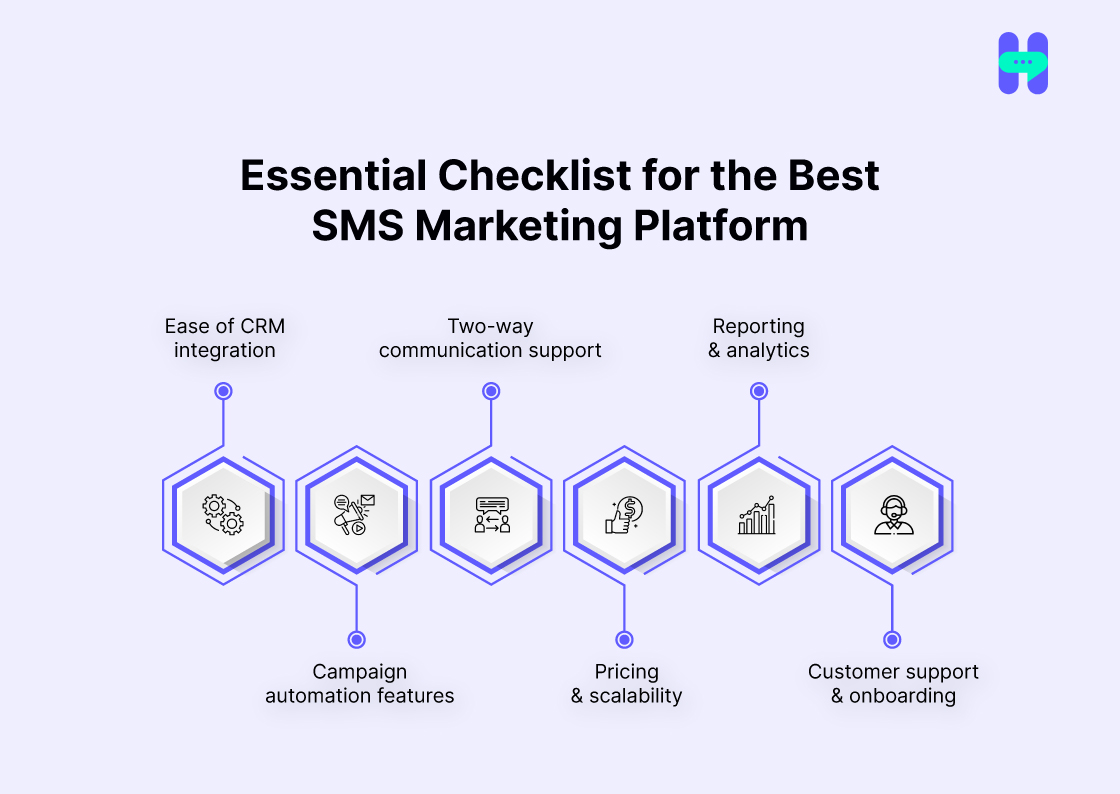
Not every SMS platform is built the same. Choosing the best SMS marketing platform means weighing features that support long-term business growth while simplifying daily operations.
Key factors to consider include:
- Ease of CRM integration
Look for direct connections with tools like Zoho, HubSpot, Salesforce, or Pipedrive. It ensures customer data syncs automatically. - Campaign automation features
From scheduling promotions to sending reminders, automation saves time and drives consistency. - Two-way communication support
Real engagement requires responses. Platforms should allow back-and-forth conversations, not just one-way blasts. - Pricing & scalability
Plans should be cost-effective for SMBs but also capable of handling enterprise-level messaging volumes as you grow. - Reporting & analytics
Access to delivery reports, engagement rates, and customer insights helps refine campaigns. - Customer support & onboarding
A platform with strong onboarding and responsive support accelerates adoption and reduces downtime.
These benchmarks ensure you select a platform that doesn’t just deliver messages but also builds meaningful customer relationships.
Conclusion
Choosing the best SMS marketing platform can transform how your business communicates with customers. The right tool not only saves valuable time but also improves ROI by connecting directly with your CRM workflows and streamlining engagement across channels.
Among the top 7 platforms reviewed, each brings unique strengths. However, HelloSend stands out for SMBs and mid-market firms that need fast setup, seamless CRM-native workflows, and multi-channel messaging without the burden of enterprise-level costs. Its balance of affordability, automation, and scalability makes it an ideal choice for growing teams.
Ready to streamline your customer messaging? Start your free trial of HelloSend today!



